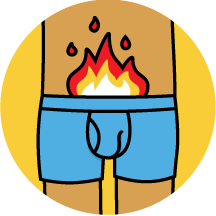Chlamydia
Chlamydia is an STD caused by bacteria. It can infect the tube that carries pee and cum through the penis. It can also infect the butthole and/or throat. It is one of the most common STDs, especially in Philadelphia.
How do I get chlamydia?
It is picked up or passed on through anal, oral or vaginal sex without a condom. The bacteria likes to live in the type of tissues that line parts of your body like the urethra, rectum, throat or vagina. When those tissues come in contact during sex, the bacteria can be passed.
How do I know if I have chlamydia?
Most people do not know they have chlamydia because they don't have symptoms. If you have symptoms, you may have a burning sensation when you pee or sometimes a pus-like discharge from your penis. Sometimes, your balls can swell and be very painful. However, not everyone has symptoms.
Guys who bottomed with a chlamydia-infected partner can experience an itchy butthole or discomfort. If you have given a blow job to a partner who has chlamydia, you can also get it in your throat.
How do I test for chlamydia?
To test for chlamydia, you should have either a pee test, a swab of your penis and also a throat and butthole swab. These are simple and painless ways to know if you have it. To find more about a testing center near you, click here.
What do I do if I have chlamydia?
If you test positive for chlamydia, you will be given a prescription for an antibiotic. This will clear the bacteria that causes chlamydia whether it is found in your throat, butthole or penis.
You can get chlamydia again so it is important not to have sex with the same partner again unless you know he received treatment. Do not have sex with any other partner for at least 7 days after your treatment has finished. If you test positive, get tested three months later to make sure you don't have it again.
Having chlamydia once and getting it treated does not mean you will not get chlamydia again. This is why it is so important to tell your partners about a positive test so that you can make sure they get treated. It also helps prevent you from getting reinfected.
Chlamydia and HIV
Using condoms every time, the correct way, will help reduce the risk of picking up and passing on both chlamydia and HIV. Research shows that having any STD or having sex with someone with an STD will increase your risk of picking up HIV. If you already have HIV, an infection like chlamydia may increase the amount of virus in your cum and increase the chance you'll pass on HIV to your guy.

